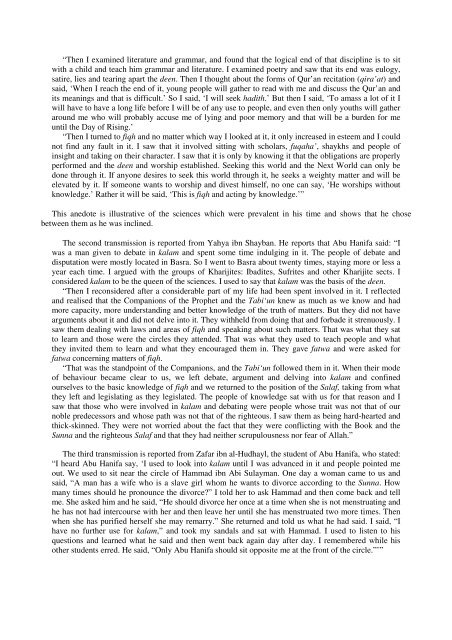Create successful ePaper yourself
Turn your PDF publications into a flip-book with our unique Google optimized e-Paper software.
“Then I examined literature <strong>and</strong> grammar, <strong>and</strong> found that the logical end of that discipline is to sit<br />
with a child <strong>and</strong> teach him grammar <strong>and</strong> literature. I examined poetry <strong>and</strong> saw that its end was eulogy,<br />
satire, lies <strong>and</strong> tearing apart the deen. Then I thought about the forms of Qur’an recitation (qira’at) <strong>and</strong><br />
said, ‘When I reach the end of it, young people will gather to read with me <strong>and</strong> discuss the Qur’an <strong>and</strong><br />
its meanings <strong>and</strong> that is difficult.’ So I said, ‘I will seek hadith.’ But then I said, ‘To amass a lot of it I<br />
will have to have a long life before I will be of any use to people, <strong>and</strong> even then only youths will gather<br />
around me who will probably accuse me of lying <strong>and</strong> poor memory <strong>and</strong> that will be a burden for me<br />
until the Day of Rising.’<br />
“Then I turned to fiqh <strong>and</strong> no matter which way I looked at it, it only increased in esteem <strong>and</strong> I could<br />
not find any fault in it. I saw that it involved sitting with scholars, fuqaha’, shaykhs <strong>and</strong> people of<br />
insight <strong>and</strong> taking on their character. I saw that it is only by knowing it that the obligations are properly<br />
performed <strong>and</strong> the deen <strong>and</strong> worship established. Seeking this world <strong>and</strong> the Next World can only be<br />
done through it. If anyone desires to seek this world through it, he seeks a weighty matter <strong>and</strong> will be<br />
elevated by it. If someone wants to worship <strong>and</strong> divest himself, no one can say, ‘He worships without<br />
knowledge.’ Rather it will be said, ‘This is fiqh <strong>and</strong> acting by knowledge.’”<br />
This anedote is illustrative of the sciences which were prevalent in his time <strong>and</strong> shows that he chose<br />
between them as he was inclined.<br />
The second transmission is reported from Yahya ibn Shayban. He reports that <strong>Abu</strong> <strong>Hanifa</strong> said: “I<br />
was a man given to debate in kalam <strong>and</strong> spent some time indulging in it. The people of debate <strong>and</strong><br />
disputation were mostly located in Basra. So I went to Basra about twenty times, staying more or less a<br />
year each time. I argued with the groups of Kharijites: Ibadites, Sufrites <strong>and</strong> other Kharijite sects. I<br />
considered kalam to be the queen of the sciences. I used to say that kalam was the basis of the deen.<br />
“Then I reconsidered after a considerable part of my life had been spent involved in it. I reflected<br />
<strong>and</strong> realised that the Companions of the Prophet <strong>and</strong> the Tabi‘un knew as much as we know <strong>and</strong> had<br />
more capacity, more underst<strong>and</strong>ing <strong>and</strong> better knowledge of the truth of matters. But they did not have<br />
arguments about it <strong>and</strong> did not delve into it. They withheld from doing that <strong>and</strong> forbade it strenuously. I<br />
saw them dealing with laws <strong>and</strong> areas of fiqh <strong>and</strong> speaking about such matters. That was what they sat<br />
to learn <strong>and</strong> those were the circles they attended. That was what they used to teach people <strong>and</strong> what<br />
they invited them to learn <strong>and</strong> what they encouraged them in. They gave fatwa <strong>and</strong> were asked for<br />
fatwa concerning matters of fiqh.<br />
“That was the st<strong>and</strong>point of the Companions, <strong>and</strong> the Tabi‘un followed them in it. When their mode<br />
of behaviour became clear to us, we left debate, argument <strong>and</strong> delving into kalam <strong>and</strong> confined<br />
ourselves to the basic knowledge of fiqh <strong>and</strong> we returned to the position of the Salaf, taking from what<br />
they left <strong>and</strong> legislating as they legislated. The people of knowledge sat with us for that reason <strong>and</strong> I<br />
saw that those who were involved in kalam <strong>and</strong> debating were people whose trait was not that of our<br />
noble predecessors <strong>and</strong> whose path was not that of the righteous. I saw them as being hard-hearted <strong>and</strong><br />
thick-skinned. They were not worried about the fact that they were conflicting with the Book <strong>and</strong> the<br />
Sunna <strong>and</strong> the righteous Salaf <strong>and</strong> that they had neither scrupulousness nor fear of Allah.”<br />
The third transmission is reported from Zafar ibn al-Hudhayl, the student of <strong>Abu</strong> <strong>Hanifa</strong>, who stated:<br />
“I heard <strong>Abu</strong> <strong>Hanifa</strong> say, ‘I used to look into kalam until I was advanced in it <strong>and</strong> people pointed me<br />
out. We used to sit near the circle of Hammad ibn Abi Sulayman. One day a woman came to us <strong>and</strong><br />
said, “A man has a wife who is a slave girl whom he wants to divorce according to the Sunna. How<br />
many times should he pronounce the divorce?” I told her to ask Hammad <strong>and</strong> then come back <strong>and</strong> tell<br />
me. She asked him <strong>and</strong> he said, “He should divorce her once at a time when she is not menstruating <strong>and</strong><br />
he has not had intercourse with her <strong>and</strong> then leave her until she has menstruated two more times. Then<br />
when she has purified herself she may remarry.” She returned <strong>and</strong> told us what he had said. I said, “I<br />
have no further use for kalam,” <strong>and</strong> took my s<strong>and</strong>als <strong>and</strong> sat with Hammad. I used to listen to his<br />
questions <strong>and</strong> learned what he said <strong>and</strong> then went back again day after day. I remembered while his<br />
other students erred. He said, “Only <strong>Abu</strong> <strong>Hanifa</strong> should sit opposite me at the front of the circle.”’”














